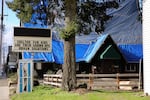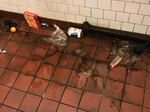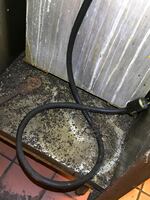Portland has few homeless shelters designed to serve families with children.
The Human Solutions Family Center, which opened in 2016, is the largest, with cots for 130 people. To understand why the family center is a big deal, it helps to meet Michael Bunch.
He’s 4 and carries around a black plastic bag filled with his favorite toys: Play-Doh and Ninja Turtle Legos.
When OPB met him, he was struggling to learn an important new word on what was moving day for his family.
His mom, Andrea Bunch, prodded him: “We’re going where?”
“To a hotel,” Michael said.
“Nope.”
Michael tried again: “Motel!”
Still not right. So Andrea gave him a hint. “To our new …”
He frowned and exhaled in frustration, so his mom provided the correct answer: “Apartment.”
Michael struggled to get that word out because he’s never had a home of his own. He and Andrea have been staying with friends, in motels or at shelters, moving from place to place his entire life.
The Bunches are part of a growing population of homeless families in Portland struggling to get into permanent housing. Not for days, or weeks, but for months, even years at a time.

Michael Bunch, 4, sits in a car on what was moving day for his family. Until then, Michael had never had a home of his own.
Amelia Templeton / OPB
It’s the population county leaders promised to help when they worked out the deal to create this family shelter. Two and a half years ago, as the cost of apartments in Portland shot up, Multnomah County gave Human Solutions more than half a million dollars to buy an old strip club, remodel it and open the family center.
The county promised the shelter would be a safe place for families in crisis, and it has credited the shelter with reducing the number of children forced to sleep on the streets and in cars.
But the shelter wasn't safe. In early February, county leaders announced they had evacuated 110 families staying there and moved them into motels.
“Yesterday I learned that the roof at one of our homeless family shelters was failing,” said County Chair Deborah Kafoury. “Multnomah County and our provider have suspended operations at the Human Solutions Family Center.”
In fact, the failing roof was just one problem among many that have led families, volunteers, social workers and staff to question the health and safety of the shelter.
The Joint Office of Homeless Services, which was created by Portland and Multnomah County the same month the shelter opened, has received multiple complaints about the facility, which it funds.
“As individual issues have come up we have worked with Human Solutions to make sure those issues were being addressed,” said Mark Jolin, director of the Joint Office.
Many of the problems at the shelter stem from the building it is in: a wooden-shingled restaurant and bar built in 1975.

For more than a year, volunteers, staff and social workers have questioned the health and safety of Human Solutions Family Center, Portland's largest shelter for families with children.
Amelia Templeton / OPB
In 2015, Multnomah County asked Human Solutions, which ran their winter warming center for families, to open up a low-barrier shelter year-round.
In return, Human Solutions pressed the county to help it buy a piece of property for the shelter. The nonprofit had been renting space for its warming center up until then and the bare-bones space lacked showers, a laundry room and a kitchen.
The property Human Solutions settled on, on SE Stark Street near the Rockwood neighborhood, had once been the Woodshed Restaurant and then a vegan strip club known as the Black Cauldron.
The deal Human Solutions proposed was unusual. They wanted a $300,000 loan to help buy the property and close to $400,000 for a renovation.
It’s rare for the county to cut checks like that without some kind of competitive process.
“This is by no means an easy 'yes' for me,” County Commissioner Loretta Smith said at the time.
She pointed out another unusual aspect of the deal: The county was in effect using public dollars to buy land for a nonprofit.
“I do have a problem with us, you know, setting up a nonprofit and giving them an asset that’s theirs,” she said.
But Kafoury pushed for the deal. Portland had just declared a housing emergency, and Kafoury said the new shelter would be a big improvement over the old one with showers, a kitchen and pretty much everything families would need to thrive in between homelessness and a permanent home. Smith ended up voting yes.
After a renovation, the new shelter opened in 2016. Almost immediately, people started noticing problems.
According to county records, Rachel O’Rourke was the first to try to get the county to intervene.
“We have kids under 5 living in conditions that I wouldn’t want any child to live under at that shelter,” she said.
O’Rourke is an art therapist who works with schools in the Gresham area. She spent close to a year visiting the shelter to create portraits with the families. She saw a lot she didn’t think was right.
“I witnessed a dad and a small baby sleeping next to belongings that went all the way up to the ceiling,” she said. “I went into the kitchen, there was dirt all over the floor.”
In September 2016, O’Rourke photographed the conditions inside the shelter and sent the pictures to friends and colleagues at Multnomah County.
A week later, staff from the Joint Office of Homeless Services went to visit the shelter themselves.
In an email, program manager Sally Erickson described the conditions as shocking and chaotic.
“There were dirty floors, overflowing trash cans and very damaged walls,” she wrote. “We observed several parents sleeping on the floor with small children and extremely over-crowded conditions, including enormous stacks of belongings. The kitchen was particularly of concern — stacks of food product, filthy dish area, and more.”

Food waste is visible on the floor of the Human Solutions Family Center. The Joint Office of Homeless Services missed warning signs about the building.
Courtesy of Glenn Dettwiler
Records show the Joint Office stepped in, giving Human Solutions money to move some families into motels to reduce the crowding, purchasing storage containers for people’s belongings and pressuring the nonprofit to hire a daily cleaning service.
But while Joint Office was focused on the high number of families at the shelter, it missed warning signs about the condition of the building itself.
Glenn Dettwiler worked briefly as the kitchen manager at the shelter and another facility run by Human Solutions in October and November 2017. He was supposed to provide three meals a day for more than 100 people. He started by trying to clean the kitchen.

Rodent droppings accumulated underneath a piece of kitchen equipment at the Human Solutions Family Center.
Courtesy of Glenn Dettwiler
“I moved a bunch of equipment, and there were literally thick layers of rodent droppings,” he said, “desiccated rodents that had died there.”
The shelter had an old walk-in refrigerator. Dettwiler said it didn’t effectively keep food cold — or rodents out.
“Rats and rodents would come inside the refrigerator and chew on food product that was in the refrigerator,” he said.
In addition to the rodents in the fridge, pigeons roosted, died and decomposed in the shelter’s attic.
Dettwiler quit after a month. He wrote to his manager and said the kitchen was below health department standards. He cited the rodent infestation, problems with the flooring and roof leaks.
“It was frustrating overall,” he said, “because you had staff that were asked to deal with situations they didn’t have the resources for.”
The families staying at the shelter noticed all this too.
“In my opinion, it should be condemned,” said Joe Tomasso, who had been staying in the shelter with his girlfriend and her sons for two months in November 2017. “It just seems to have so many different issues.”
Shortly after they arrived, staff at the shelter smelled a gas leak that eventually took two weeks to fix. During that time, the hot water was turned off.
“Then you can’t take a shower, you can’t wash your laundry, you can’t wash your hands,” he said.
Records show it was the third gas leak since the shelter opened.
“Was that frustrating for folks to be without hot water? Absolutely,” said Andy Miller, Human Solutions' executive director, who spent more than an hour speaking on the record to OPB about problems at the shelter.
But, he noted, every shelter in the city experiences challenges like these at some point.
“Those issues will be exacerbated in a shelter that faces very, very high utilization over a concentrated period of time,” he said.
Human Solutions says its staff has hired contractors to deal with the gas leaks, signed a contract with a pest control company and changed how they store food to protect it from mice.
Yet of all the problems at the shelter, the most serious is the leaking roof.
This is the first story of a multipart series by OPB detailing health and safety issues at Portland's largest shelter for homeless families with children. Read the second part here.

